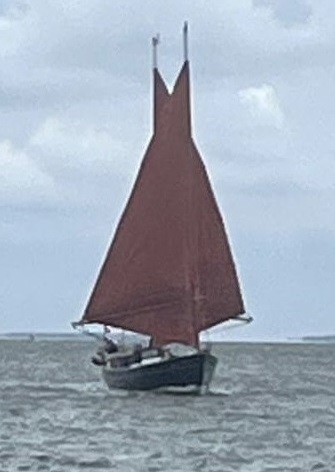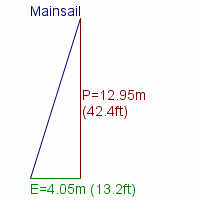Review of Freedom 40

Basic specs.

Looking for a new boat? Find a Freedom 40 or similar boat for sale
The hull is made of fibreglass. Generally, a hull made of fibreglass requires only a minimum of maintenance during the sailing season.
The boat is equipped with a galley and toilet facility.
The Freedom 40 is equipped with a ketch rig. A ketch rig is generally considered easier to handle, because the sails are smaller, and because it can sail on most points to the wind with one sail completely taken down for repair or while reefing. The sail configuration of a ketch allows for better comfort and stability when sailing downwind or on a broad reach.
The Freedom 40 has been built with different keel alternatives.
Full keel
One option is a long keel. A full keel provide a better directional stability than a similar boat with a fin keel; on the other hand, better directional stability means also that the boat is more difficult to handle in a harbour with less space.
The boat can enter even shallow marinas as the draft is just about 1.22 - 1.32 meter (4.00 - 4.30 ft) dependent on the load. See immersion rate below.
CentreBoard
Another option is a centreboard keel. A centreboard keel is a pivoting lifting keel, allowing to sail both coastal and inland waters.
Freedom 40 can enter even shallow marinas as the draft is just about 1.37 - 1.47 meter (4.49 - 4.79 ft) dependent on the load. See immersion rate below.
The boat may be equipped with an inboard Yanmar diesel engine
The transmission is a shaft drive. A shaft drive will in the long run require less maintenance than other types of drive e.g. a sail drive.
Sailing characteristics
This section covers widely used rules of thumb to describe the sailing characteristics. Please note that even though the calculations are correct, the interpretation of the results might not be valid for extreme boats.
What is Capsize Screening Formula (CSF)?
The capsize screening value for Freedom 40 is 1.77, indicating that this boat could - if evaluated by this formula alone - be accepted to participate in ocean races.
What is Theoretical Maximum Hull Speed?
The theoretical maximal speed of a displacement boat of this length is 8.3 knots. The term "Theoretical Maximum Hull Speed" is widely used even though a boat can sail faster. The term shall be interpreted as above the theoretical speed a great additional power is necessary for a small gain in speed.
The immersion rate is defined as the weight required to sink the boat a certain level.
The immersion rate for Freedom 40 is about 283 kg/cm, alternatively 1590 lbs/inch.
Meaning: if you load 283 kg cargo on the boat then it will sink 1 cm.
Alternatively, if you load 1590 lbs cargo on the boat it will sink 1 inch.
Sailing statistics
This section is statistical comparison with similar boats of the same category. The basis of the following statistical computations is our unique database with more than 26,000 different boat types and 350,000 data points.
What is Motion Comfort Ratio (MCR)?
The Motion Comfort Ratio for Freedom 40 is 29.0.
What is L/B (Length Beam Ratio)?
The l/b ratio for Freedom 40 is 3.33.
What is Displacement Length Ratio?
The DL-ratio for Freedom 40 is 162 which categorizes this boat among 'light racers'.
SA/D (Sail Area Displacement ratio)
Indicates how fast the boat is in light wind:
- Cruising Boats have ratios 10-15
- Cruiser-Racers have ratios 16-20
- Racers have ratios above 20
- High-Performance Racers have ratios above 24
Sail-area/displacement ratio (SA/D ratio): 17.23
Maintenance
When buying anti-fouling bottom paint, it's nice to know how much to buy.
The surface of the wet bottom is about 42m2 (452 ft2).
Based on this, your favourite maritime shop can tell you the quantity you need.
Note: If you use a paint roller you will need more paint than if you use a paintbrush.
Dimensions of sail for ketch rig.

Are your sails worn out? You might find your next sail here: Sails for Sale
If you need to renew parts of your running rig and is not quite sure of the dimensions, you may find the estimates computed below useful.
| Usage | Length | Diameter | ||
| Mainsail halyard | 33.7 m | (110.5 feet) | 12 mm | (1/2 inch) |
| Jib/genoa halyard | 33.7 m | (110.5 feet) | 12 mm | (1/2 inch) |
| Spinnaker halyard | 33.7 m | (110.5 feet) | 12 mm | (1/2 inch) |
| Jib sheet | 12.2 m | (40.0 feet) | 14 mm | (0.55 inch) |
| Genoa sheet | 12.2 m | (40.0 feet) | 14 mm | (0.55 inch) |
| Mainsheet | 30.5 m | (100.0 feet) | 14 mm | (0.55 inch) |
| Spinnaker sheet | 26.8 m | (88.0 feet) | 14 mm | (0.55 inch) |
| Cunningham | 4.0 m | (13.3 feet) | 12 mm | (1/2 inch) |
| Kickingstrap | 8.1 m | (26.6 feet) | 12 mm | (1/2 inch) |
| Clew-outhaul | 8.1 m | (26.6 feet) | 12 mm | (1/2 inch) |
This section is reserved boat owner's modifications, improvements, etc. Here you might find (or contribute with) inspiration for your boat.
Do you have changes/improvements you would like to share? Upload a photo and describe what you have done.
We are always looking for new photos. If you can contribute with photos for Freedom 40 it would be a great help.
If you have any comments to the review, improvement suggestions, or the like, feel free to contact us. Criticism helps us to improve.
